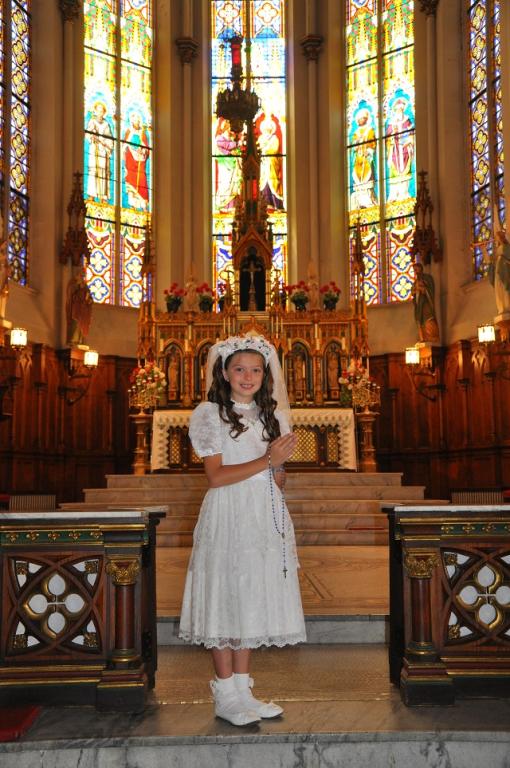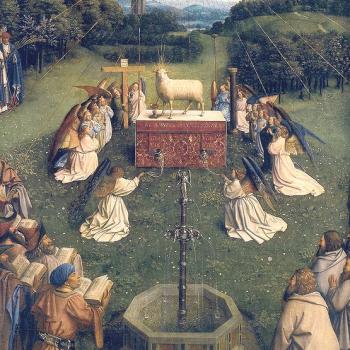
Our daughter at her first Holy Communion (7-24-11), at our home parish for 25 years this month: St. Joseph’s in Detroit (German Gothic Revival style: 1870s). It has some of the most beautiful stained glass in America and one of the largest bells.
* * *
* * *
Can. 846 ß1 The liturgical books, approved by the competent authority, are to be faithfully followed in the celebration of the sacraments. Accordingly, no one may on a personal initiative add to or omit or alter anything in those book
The Church has dealt with such abuses, in Redemptionis Sacramentum, On certain matters to be observed or to be avoided regarding the Most Holy Eucharist (Congregation for Divine Worship and the Discipline of the Sacraments, Rome, on the Solemnity of the Annunciation of the Lord, 25 March 2004; Francis Cardinal Arinze, Prefect):
[51.] Only those Eucharistic Prayers are to be used which are found in the Roman Missal or are legitimately approved by the Apostolic See, and according to the manner and the terms set forth by it. “It is not to be tolerated that some Priests take upon themselves the right to compose their own Eucharistic Prayers” or to change the same texts approved by the Church, or to introduce others composed by private individuals.
[52.] The proclamation of the Eucharistic Prayer, which by its very nature is the climax of the whole celebration, is proper to the Priest by virtue of his Ordination. It is therefore an abuse to proffer it in such a way that some parts of the Eucharistic Prayer are recited by a Deacon, a lay minister, or by an individual member of the faithful, or by all members of the faithful together. The Eucharistic Prayer, then, is to be recited by the Priest alone in full.
[53.] While the Priest proclaims the Eucharistic Prayer “there should be no other prayers or singing, and the organ or other musical instruments should be silent”, except for the people’s acclamations that have been duly approved, as described below.
[54.] The people, however, are always involved actively and never merely passively: for they “silently join themselves with the Priest in faith, as well as in their interventions during the course of the Eucharistic Prayer as prescribed, namely in the responses in the Preface dialogue, the Sanctus, the acclamation after the consecration and the “Amen” after the final doxology, and in other acclamations approved by the Conference of Bishops with the recognitio of the Holy See.”
59.] The reprobated practice by which Priests, Deacons or the faithful here and there alter or vary at will the texts of the Sacred Liturgy that they are charged to pronounce, must cease. For in doing thus, they render the celebration of the Sacred Liturgy unstable, and not infrequently distort the authentic meaning of the Liturgy.
It seems simple enough that a priest ought to be up to speed as to what he is permitted to do and not do, with the liturgy. How difficult is that? A night or two curled up on a couch with the appropriate documents would seem to be sufficient. Because it is seemingly not difficult to determine the rules and rubrics (we are doing it ourselves here in this thread), one can only conclude that priests who do not either are lax in the matter or being deliberately disobedient and seeing how much they can get away with.
My solution? Of course it is always great to pray in any situation, but one way (as a last resort. mind you) that will accomplish this goal is to speak with your feet: find another parish that does honor the instructions of the magisterium. People leaving cause income of the parish to go down. Money speaks. It’s sad that it has to be that way, but whatever works . . .
We as laypeople have a perfect right to experience the Mass the way it is intended to be conducted. As long as we don’t fall into a “church-hopping” mentality, we can choose to (after having exhausted all other avenues) leave a parish if there are serious problems that do not seem to ever be rectified.
I want to make it very clear that one should choose to leave a parish in the event of truly serious, ongoing abuses, not just a few incorrect words here and there. The Eucharist is what it is, of course, but that’s not at issue, which is the right of Catholics to participate in Mass the way it is intended to be by the Church.
It’s precisely because every individual Catholic has an authority higher than the parish priest (the bishop and the pope and the magisterium of the Church), that sometimes he or she can “vote with their feet” and be perfectly within their “rights” as a Catholic to do so (and not merely an individualist, as so often in Protestantism). The problem lies with the priest or other “liturgy abusers” at their parish, not with them.
But I fully agree that this is a final recourse, not the first thing to impulsively do. Speaking for myself, I haven’t personally criticized a priest in my parish a single time for anything, in my 17+ years as a Catholic. But of course I am spoiled a bit at my parish because everything is conducted so wonderfully there.
The fact remains that there are rubrics and instructions, and these are sufficiently clear. If we point out an abuse to a priest (backed with authoritative Church documents), with perfect humility and graciousness (maybe over dinner or in the midst of twenty compliments, etc., and without the slightest hint of an unsavory “judgmental” or superior attitude) and he simply refuses to make the needed changes, then whether or not his error was inadvertent before, it is now deliberately opposed to Church instruction, since he has been informed of his error.
And what does one do in that situation, if the priest persists in the error? Watch your attitude; pray; absolutely! That’s a given. But in the final analysis, like I said, the layman has the right as a Catholic, to the Mass as it ought to be (just as the increasing yearning for the Tridentine Mass as a live option in Catholic worship has arguably played a big role in the present greater availability of that Mass).
Again, I agree with you about attitudes and priorities, and not entering into unwise battles over relatively small abuses (though they be real and troubling). But there comes a point when one can leave in good conscience, having tried other means with no success.
We all have our own experiences. I haven’t (thank God) been subject to all these abuses and doctrinal absurdities (including RCIA horror stories), that I hear about distressingly often here, and from other Catholics elsewhere. Consequently, I’ve been at my parish the entire time since I was received into the Church (in February 1991), and have not had a single situation where I felt compelled to ever “correct” my parish priest.
I would say in summary that a priest has a responsibility to make sure the liturgy is done properly and correctly. This is central to his task as a priest (along with dispensing sacraments, administration, prayer, visitation, etc.). He is no more immune from doing his job properly than anyone is, whether it is making sure to teach proper Catholic doctrine (as in my situation as an apologist and now moderator of the CHN discussion board) or balancing the books properly if one is an accountant or following the standard procedures of doctors and nurses, or constructing a road or a building the right way, or preparing a good meal at a restaurant. Whatever it is, a worker in his field has the responsibility to do it right. All the more in the case of the Catholic liturgy, because of its supreme importance.
Many priests may simply be unaware that they are doing anything wrong. I grant that, and am happy this is the reason rather than disobedience. But once they are made aware that they ought not do something and continue to do so, then there is a serious problem in their attitude, not necessarily in the super-seriousness of a word here or there being botched.
I respect no people on earth more than I do priests and religious. I’m in awe of them. But they are not immune from criticism, when they do things wrong, and come to know without a doubt that they are wrong, yet continue to do it.
The priest is subject to the bishop, and so a layman can appeal to a bishop for recourse against priestly abuses of the liturgy, just as we can sometimes go over the head of our supervisors at work, to the “big boss” (or higher up the ranks in the military, in serious situations).
That is not taking matters “into my own hands.” Laymen are not deprived of all say-so whatsoever in the Church, as if we are dumb sheep. That’s not even true in doctrinal matters, where there is such a thing as the “consent of the faithful” (sensus fidelium) that Cardinal Newman has eloquently written about. It’s how the Catholic Church works. And we can also appeal to the pope in the case of erring bishops.
Let it be rare, well thought through and considered, done with the right attitude, soaked in prayer; amen! But I don’t see how it is intrinsically improper to take such measures, failing gentler ones. I think this is a sort of assumed premise or “sub-discussion” that is occurring in this thread alongside the original topic of the objectionable liturgical messing-around of some priests.
Vatican II highly stressed active liturgical participation of all at Mass. It occurred to me that this is another very relevant factor in laymen speaking up about liturgical abuse. This means that, to the extent that abuses occur, now we are also forced to participate (in one sense) in the same error. And that is simply unacceptable. It doesn’t have to be, and there are things we can do about it.
If talking charitably, kindly, but firmly to our priests and bishops does not change this, then we should go to a parish where it is done right, and if enough people together decide to do that, then perhaps some necessary changes will be made.
This is being a conscientious Catholic and seeking to worship at Mass the way that the magisterium wants it to be, not trying to simply go our own way, as if there was anything wrong with it.
I again offer the analogy of the availability of the Tridentine Mass. If the faithful kept expressing that they wanted that option (and often due to the shabby, shoddy nature of how so many Novus Ordo Masses are done today), and that helped to cause two popes to increasingly abide by their wishes, then surely we can also complain about liturgical abuses and try to rectify that situation as well. The last two popes have often written about such things, so it is perfectly proper for laypeople to follow their lead, as long as we do it with the proper respect and humility for those who have authority over us in the Church.
Absurd, prejudicial reactions to “liturgical protests” from priests and bishops, where they occur, are indicative of a problem in these priests and bishops. They seem too often to be beset by a certain paranoia or abject fear of an intelligent, faithful, articulate layman pointing out to them (based on clear Church guidelines) that they have done anything wrong. It’s as if they see themselves as immune from all criticism. This is “sacerdotalism” at its worst, and (somewhat ironically) approaches the mentality of Protestant pastors, who are also often unapproachable (as I know from sad personal experience).
Surely there are nuts and overly self-important zealots among the laymen who go about such a things wrongly and with a self-righteous, condemnatory attitude. But that doesn’t mean there are no legitimate complaints or none that should be made. We shouldn’t cease saying what needs to be said because some of our clergy act improperly when someone dares to correct them, in charity and with humility and reverence for their office. The reaction ought not totally determine what we do.
And so I would contend that — precisely because of these manifested ridiculous attitudes (where they occur) –, sometimes (as a last resort only) we are forced to vote with our feet. We have a right to the Mass as intended by the Church. If we allow ourselves to be subjected to nonsense, as a result of a man who is not following Church guidelines, we are subject to the whims of mere men.
Man, I’m so glad I’m in a parish where this stuff doesn’t happen! I don’t have the patience for it. The way I deal with liberalism and nonsense in the Church is to 1) ignore it on a personal level, and 2) denounce it in my writings. But I have the luxury of being in a great parish, that (sadly) not many have.
One CHN board member was asking about how to identify a good parish:
Today, it is fairly easy to find a good parish, almost by a default method. If it doesn’t present a goofy, trendy version of the liturgy, and gets it right, that is the first big clue. Follow the missal, to verify that. And if it offers all these sorts of things that you mention, that is the other big clue.
Devotion to the Blessed Virgin and obedience to the Holy Father are two other clear indications that you are in a solid, orthodox parish. Look at any books that are offered. If you see good orthodox publishers like Ignatius, OSV, and Sophia, and promotion of EWTN and Catholic radio, then you’re probably in a good parish.
It is simply a matter of learning a few telltale signs, so you can avoid nonsense before ever getting committed to a particular parish. The goal is to find a good parish, not the church-hopping mentality. Once you find one, stay there, and be very committed to it, and don’t ever plan on leaving for less than extremely serious or necessary reasons. I’ve been at mine for over 17 years.
In any relatively large metro area, you should be able to find a very good, orthodox parish (mine is right outside of downtown Detroit, near the baseball and football stadiums). In rural areas, however, one doesn’t have much of a choice, usually, and it can be a cross to bear, enduring mediocrity, spiritual pablum in homilies, and departures from the rubrics. But you still have Jesus present in the Eucharist, unless it is an outright invalid Mass (which is rare). Keep your focus on that (i.e., Him).
***
Let criticism of a priest be rare, well thought-out, with the right attitude, & soaked in prayer. But it’s not intrinsically improper to take such measures.












